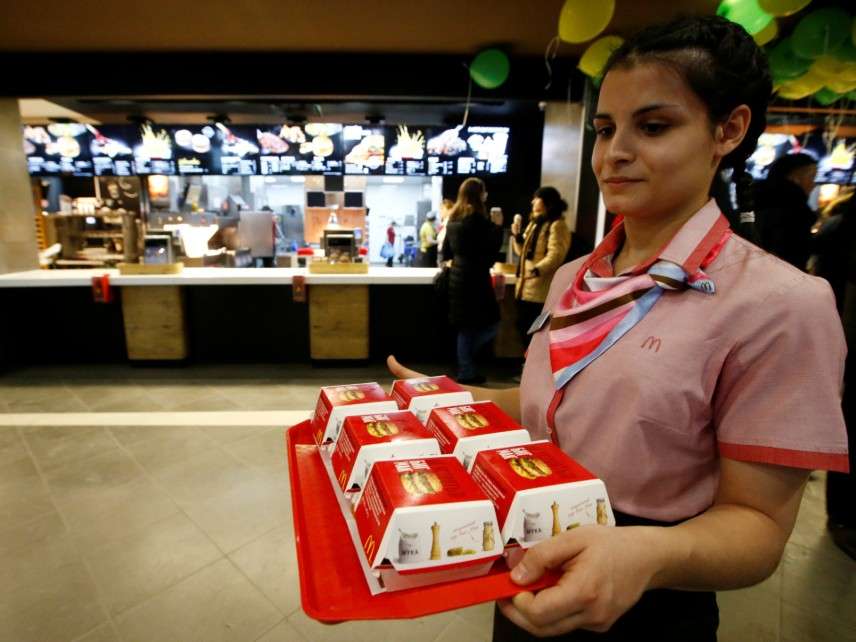NYC Bill Would Outlaw Unfair Terminations in the Fast Food Industry
The proposal comes as restaurants struggle with the city's new $15 minimum wage.

In recent years, the Big Apple's fast food industry has trailblazed for employee protections and higher wages, particularly as the driving force behind the "Fight for 15." It's a battle they won with the passage of New York's $15 minimum wage law. Now they're setting their sights on eliminating unfair firings.
"Workers have told me they've been fired for no reason at all," Democratic City Councilman Brad Lander, who introduced a bill to ban the practice in the fast food industry, told The Guardian. "Should employers have the right to fire people for any reason, including the most trivial reasons? Most people would say that's not a right people should have."
Proponents say that, in dismissing employees, fast-casual restauranteurs should need to show "just cause"—that is, proof of serious misconduct. But what compromises that misconduct is somewhat ambiguous. Under Lander's legislation, workers will be able to appeal firings via arbitration, a complaint to the Department of Consumer Affairs, or with a lawsuit.
Ironically, some of those terminations are likely the result of the movement's last legislative victory, with restaurants purging jobs in the wake of the city's minimum wage hike. Fifty-three percent of New York's "limited service" establishments—otherwise known as fast-casual spots—plan to eliminate positions this year in response to the wage increase, according to a survey by the New York Hospitality Alliance. That comes after 50 percent did so in 2018.
"There's a misperception about the profitability of restaurants in general," Chris Westcott, CEO of Rosa Mexicano, tells Eater NY. "Everyone thinks we're rolling in it. And it's tight. There's a limit to what we can spend."
Westcott isn't wrong: The restaurant industry operates on slim profit margins, which peak around 4 percent, according to the financial information company Sageworks. So significant hikes to the minimum wage often necessitate staff reductions, as businesses struggle under the weight of increased labor costs. But employers may find themselves in a costly arbitration process for terminating employees they can't afford to keep, according to Michael Lotito, a labor attorney who represents the restaurant industry.
"I don't know how a small business owner would be able to survive in the circumstances of that bill," he tells Reason. While layoffs for economic reasons are hypothetically permitted under "just cause," there is quite a bit of uncertainty as to how the law would work in practice—meaning cash-strapped franchise owners could be susceptible to lawsuits for making bottom-line business decisions.
"It is that fear that will inhibit job growth, job expansion," Lotito says. That's especially true if its sister bill also passes, championed by Democratic councilmember Adrienne Adams: It would require that all staff layoffs be made in order of seniority, regardless of employee performance. "What you'll wind up doing is just buying everybody out, because it's going to be too expensive to arbitrate everything," Lotito predicts.
Employing people will be so expensive, he says, that many business owners will likely pivot to automation. Fast food employees are particularly vulnerable to advances in technology, as more than 70 percent of their tasks are easily automatable, according to a report by the Brookings Institution. McDonald's, Panera, and KFC have already started integrating self-service kiosks, a trend that would snowball if employers feared a stream of lawsuits.
The National Restaurant Association echoes those sentiments. "Imposing burdensome and discriminatory legislation that only targets quick-service operators would greatly impact operations of New York City restaurants, making it harder for New Yorkers to pursue a rewarding career in the industry," a spokesperson for the group tells Reason.
Meanwhile, 75 percent of limited service establishments plan to cut hours this year in response to increasing labor costs, according to the New York Hospitality Alliance survey. But if Lander's proposal passes, they'll be restricted from doing that too. The bill prohibits fast-casual businesses from reducing an employee's hours by 15 percent or more unless they can furnish an acceptable excuse.
While the bill is an unprecedented move, New York restaurants are no strangers to city micromanagement. A law passed in 2017 that set rules on how employers can schedule staff is costing companies "thousands of dollars a pay period" in fines, according to Lotito, because the rules are "impossible to comply with."
In that vein, the unfair firings bill is just the latest in a long line of bad ideas, the totality of which will likely force many small business owners to leave the Big Apple entirely. "It's not just this one statute," says Lotito. "It's the chorus of statutes. It's the message that's being sent, that we are more progressive than other cities—and if you don't like it, you can leave."


Show Comments (186)